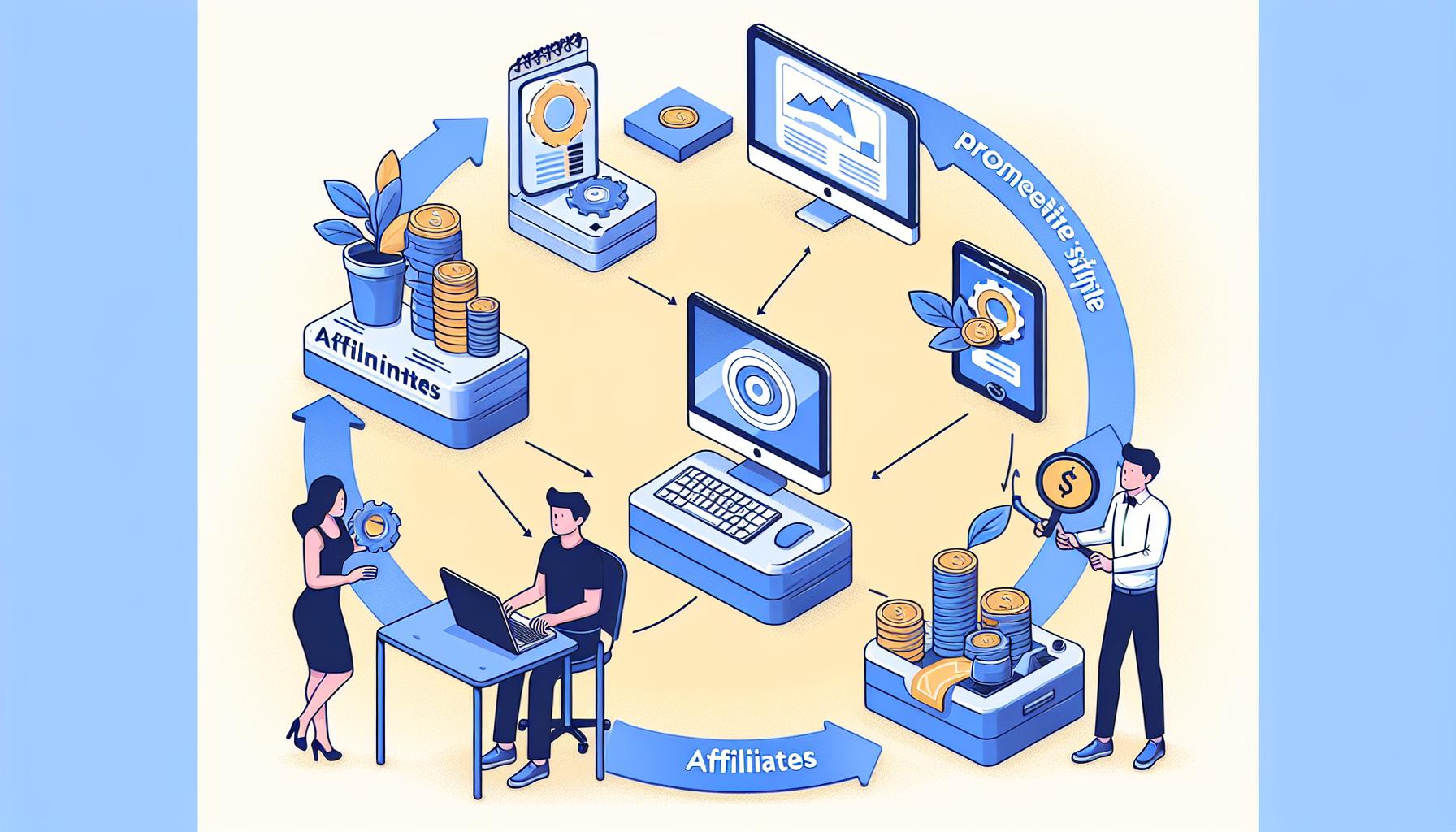Diving into the world of affiliate marketing transformed my approach to online business, and it’s a game-changer for anyone looking to monetise their online presence. At its core, affiliate marketing involves promoting products or services and earning a commission for every sale or action completed through your referral. It’s a powerful strategy that leverages the vast potential of the digital landscape.
The beauty of affiliate marketing lies in its simplicity and efficiency. You don’t need to create a product or manage inventory; your focus is on sharing information and connecting products with the right audience. The benefits are immense, from generating passive income to enhancing your content with valuable resources for your audience. I’ve navigated through the intricacies of this model and found it to be an invaluable asset in growing my online platform.
What is Affiliate Marketing?
In my journey navigating the complex world of digital marketing, I’ve realised that affiliate marketing stands out as a remarkably efficient strategy, especially for business owners and marketing directors of eCommerce brands in the UK. At its core, affiliate marketing is a performance-based marketing model that rewards affiliates—like me—for each visitor or customer brought by the affiliate’s own marketing efforts.
This strategy hinges on a simple yet powerful principle: leveraging the networks and audiences of others to promote your products or services. It’s a win-win scenario. As a business owner, you get your product in front of a wider audience with minimal effort, and as an affiliate, I earn a commission for each sale or action completed through my referral. This seamless integration into existing marketing strategies makes affiliate marketing an attractive option for eCommerce brands looking to expand their reach without overextending their in-house resources.
For eCommerce brands across the UK, diving into affiliate marketing means tapping into a diverse pool of affiliates with varied audiences. This diversity enables brands to reach different segments of their target market more effectively than with traditional marketing methods alone. Statistics show that businesses leveraging affiliate marketing strategies tend to see a higher return on investment (ROI), with some studies indicating an average ROI of 12:1.
| Strategy | Average ROI |
|---|---|
| Affiliate Marketing | 12:1 |
Moreover, the versatility of affiliate marketing allows for a broad range of products and services to be promoted in a manner that feels personal and trustworthy to potential customers. I’ve observed that authentic, well-placed product recommendations tend to perform better than generic advertisements, particularly because they come from trusted sources within specific niches or communities.
For those of you running an eCommerce brand, it’s essential to recognise the potential of affiliate marketing not only as a tool for increasing sales but also for building long-lasting relationships with both affiliates and your customer base. The indirect benefit of enhanced brand visibility and reputation through association with trusted influencers and content creators can be just as valuable as the direct sales generated. Choosing the right affiliates, then, becomes crucial to ensure that your brand is represented in the best possible light.
How Does Affiliate Marketing Work?

Before diving deeper into the intricacies of affiliate marketing, it’s crucial to unpack how this model operates. Understanding the mechanism behind affiliate marketing is the first step towards leveraging its full potential for your eCommerce brand in the UK.
At its core, affiliate marketing involves three key players: the merchant (that’s you), the affiliate, and the customer. Here’s a basic outline of the process:
- The merchant: As a business owner or a marketing director of an eCommerce brand, you’re the party looking to increase sales or drive specific actions (like sign-ups). You offer a commission to outsiders (affiliates) for successfully bringing in customers or achieving the desired actions.
- The affiliate: This is an individual or a company that promotes your products or services through various channels, including blogs, social media platforms, and websites. They use unique tracking links to refer traffic to your website.
- The customer: Ultimately, the consumer plays a crucial role in this model. They purchase your products or complete desired actions through the affiliate’s referral, which is tracked back to them, earning the affiliate their commission.
Key Components of a Successful Affiliate Marketing Strategy
To make affiliate marketing work effectively for your brand, several components must come into play:
- Selection of the right affiliates: It’s critical to partner with affiliates whose audiences align with your target market. Their reach, reputation, and alignment with your brand values can significantly impact the success of your campaigns.
- An attractive commission structure: To attract top affiliates, you need to offer competitive commissions. This motivates them to put in the effort required to promote your products or services effectively.
- Robust tracking and reporting tools: Utilising sophisticated affiliate tracking software ensures every referral is accurately monitored, and affiliates are fairly compensated. This transparency builds trust and encourages long-term collaborations.
- Engagement and support: Active engagement with your affiliates, offering them the necessary resources and support, can boost their performance. Regular communication, updates on new products, and marketing materials are essential.
Benefits of Affiliate Marketing

When I delve into the myriad advantages of affiliate marketing, it’s hard not to get excited about the potential it holds for business owners and marketing directors of ecommerce brands across the UK. This strategy isn’t just a way to boost sales; it’s a comprehensive solution for several business challenges.
First off, affiliate marketing is cost-effective. Unlike traditional advertising, where costs can spiral out of control with no guaranteed return on investment, you pay for performance in affiliate marketing. This means you only pay commissions when a sale is made. This performance-based fee structure keeps marketing costs predictable and aligned with your revenue.
Moreover, affiliate marketing offers an expanded reach. Affiliates come from diverse niches and backgrounds, many with their own loyal followings. Partnering with these affiliates grants access to these varied audiences, significantly expanding your brand’s visibility beyond its existing customer base. This reach is invaluable for ecommerce brands looking to break into new markets or demographic segments.
Another key benefit is increased credibility. Affiliates often have established relationships with their audience, who trust their recommendations. When these affiliates promote your products, their endorsement serves as a powerful form of social proof, enhancing your brand’s credibility and reputation among potential customers.
Affiliate marketing also drives higher traffic and SEO value. The links from affiliates’ sites to your ecommerce platform not only drive direct traffic but also improve your site’s search engine ranking through backlinks, a critical factor in SEO. This can result in organic growth and increased visibility on search engines.
Lastly, the scalability of affiliate marketing cannot be overstated. As your network of affiliates grows, so does your brand’s reach and potential for sales, without a corresponding increase in marketing effort from your side. You have the flexibility to engage as many or as few affiliates as you wish, allowing you to scale your marketing efforts according to your business needs.
Affiliate marketing thus serves not just as a strategy for driving sales, but as a multifaceted tool for solving a range of business problems. Its performance-based nature makes it a low-risk, high-reward component of your marketing mix. As business owners and marketing directors endeavour to navigate the complexities of the ecommerce landscape, embracing affiliate marketing could well be the key to unlocking new levels of success and growth for your brand.
Generating Passive Income with Affiliate Marketing

When I dive into the world of affiliate marketing, it’s clear that passive income is one of the most compelling benefits for business owners and marketing directors of ecommerce brands across the UK. Unlike traditional sales models that require constant hands-on effort, affiliate marketing offers the potential for money to be made while focusing on other aspects of business management and growth.
Understanding Passive Income in Affiliate Marketing
Passive income, in the context of affiliate marketing, is generated through commissions that accrue over time. This happens when customers continue to make purchases using affiliate links, without any additional active effort from the merchant’s side after the initial setup. The beauty of this system lies in its simplicity and efficiency. Here’s how it unfolds:
- Set Up: Initially, there’s a need to set up the affiliate program, which involves selecting the right affiliates and deciding on commission structures.
- Launch: Once launched, affiliates begin to promote the products on their platforms—whether blogs, social media, or websites.
- Earn: Every time a purchase is made through an affiliate link, a commission is earned, contributing to the overall passive income.
Leveraging Affiliates for Sustainable Growth
The power of affiliate marketing doesn’t just stop at generating passive income. It extends to leveraging affiliates to achieve sustainable growth for ecommerce brands. With the right affiliates, brands can tap into new markets and demographics, expanding their reach far beyond traditional advertising methods. Here’s how:
- Diverse Traffic Sources: By partnering with affiliates who have different audiences, ecommerce brands can diversify their traffic sources, minimising risk and dependence on a single marketing channel.
- Cost-Effectiveness: Paying for performance rather than potential exposure means that marketing budgets are used more effectively, targeting actual conversions over impressions.
- Increased Credibility: Recommendations from trusted affiliates can boost a brand’s credibility, as endorsements serve as informal reviews.
Key Strategies for Maximising Earnings
To maximise earnings from affiliate marketing, it’s crucial to adopt certain strategies. These include selecting affiliates whose audiences align with the brand’s target demographic, offering competitive commissions to encourage higher performance, and using advanced tracking tools to monitor results. Effective communication with affiliates is also vital. It ensures that they have all the tools necessary to succeed, from promotional materials to product insights.
Enhancing Your Content with Affiliate Marketing

When I first dived into the world of affiliate marketing, I quickly realised its power not just as a revenue stream but as a tool to enrich my content. For business owners and marketing directors of eCommerce brands across the UK, leveraging affiliate marketing can solve a multitude of challenges, especially in creating content that engages and converts.
At its core, integrating affiliate marketing into your content strategy adds layers of value for your audience. By thoughtfully selecting products or services that resonate with your readers, you’re not only guiding them towards purchases that meet their needs but also building a level of trust and authority. This trust is paramount. When customers see that you’re recommending products that genuinely align with their interests and your brand’s ethos, they’re more likely to engage with your content and, ultimately, follow through with a purchase.
In my journey, I’ve realised that the key to enhancing content with affiliate marketing lies in the Seamless Integration of these products or services. Here’s how:
- Curate Affiliate Products That Align With Your Audience’s Interests: Understand your audience deeply. The more aligned the affiliate offerings are with their needs and your content’s theme, the more natural the integration feels.
- Use High-Quality Visuals and Descriptive Content: High-resolution images, engaging videos, and insightful descriptions make affiliate products more enticing and can significantly boost conversion rates.
- Educational Content That Adds Value: It’s not just about selling; it’s about educating your audience. Guides, how-tos, and tutorials that incorporate affiliate products solve your customers’ problems and guide them towards making informed decisions.
For eCommerce brands especially, tapping into the power of content creators, influencers, or bloggers within your niche can open up a wealth of opportunities. These partnerships can introduce your brand to new audiences, diversify your traffic sources, and add fresh, compelling content to your platforms. Moreover, influencers often bring with them a loyal following, whose trust they’ve already earned, making their recommendations incredibly powerful.
Here’s a little insight into how adopting affiliate marketing has impacted content strategies:
| Strategy | Impact |
|---|---|
| Curated Affiliate Links | Improved Audience Engagement |
| High-Quality Visuals | Higher Conversion Rates |
| Educational Content | Increased Time Spent on Site |
Conclusion
Embarking on the affiliate marketing journey has revolutionised how I approach content creation and audience engagement. By carefully selecting affiliates that resonate with my audience and crafting content that genuinely adds value, I’ve witnessed a significant uptick in traffic and conversions. It’s not just about promoting products; it’s about weaving these recommendations seamlessly into content that educates and entertains. The scalability of affiliate marketing means that as my audience grows, so too does the potential for revenue – without a corresponding increase in effort or cost. Partnering with influencers and content creators has amplified my reach, bringing fresh eyes and increased credibility to my platform. Ultimately, affiliate marketing has not only enhanced my content strategy but also solidified my site’s position as a trusted resource in my niche. For anyone sitting on the fence, I’d say dive in – the benefits are too compelling to ignore.
Frequently Asked Questions
What is affiliate marketing?
Affiliate marketing is a performance-based marketing strategy where businesses reward external partners (affiliates) for directing traffic or sales to their products or services through the affiliate’s marketing efforts.
How does affiliate marketing work?
In affiliate marketing, affiliates promote a company’s products or services using a unique affiliate link. When someone clicks on this link and makes a purchase or completes a desired action, the affiliate earns a commission from the sale or action.
Why is selecting the right affiliates important?
Selecting the right affiliates is crucial because it ensures that your products or services are marketed by individuals or entities that align with your brand values and target audience, thus increasing the effectiveness of your affiliate marketing campaign.
What is an attractive commission structure in affiliate marketing?
An attractive commission structure offers competitive rates that incentivise and reward affiliates adequately for their marketing efforts, driving them to promote your products or services more effectively.
How do tracking and reporting tools enhance affiliate marketing?
Tracking and reporting tools provide detailed insights into affiliate performance, enabling businesses to monitor sales, track conversions, and assess the overall effectiveness of their affiliate marketing strategies for better decision-making and strategy adjustments.
What are the main benefits of affiliate marketing?
The main benefits of affiliate marketing include cost-effectiveness, expanded reach, increased credibility, higher traffic and SEO value, and scalability, making it an appealing marketing strategy for businesses of all sizes.
How can affiliate marketing enhance content?
Affiliate marketing enhances content by allowing creators to curate affiliate products that resonate with their audience, incorporate high-quality visuals and descriptions, and create educational content that adds value, thereby improving engagement and conversions.
Why partner with content creators or influencers for affiliate marketing?
Partnering with content creators, influencers, or bloggers within your niche exposes your products or services to a wider, more engaged audience, increasing the likelihood of higher conversion rates due to the trust their followers have in their recommendations.
How has affiliate marketing impacted content strategies?
Affiliate marketing has positively impacted content strategies by improving audience engagement, increasing conversion rates, elevating the time spent on site, and allowing for more strategic content planning focused on audience needs and interests.




